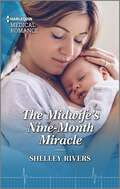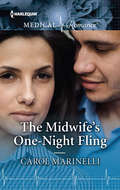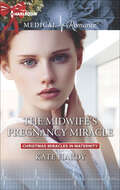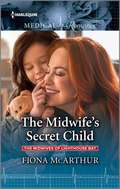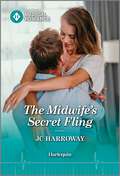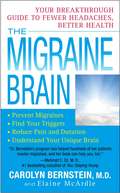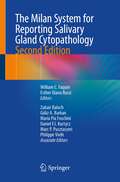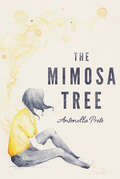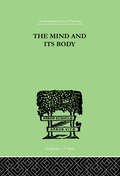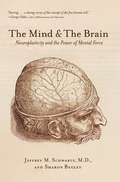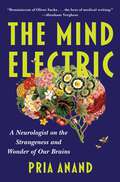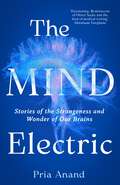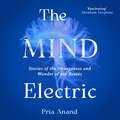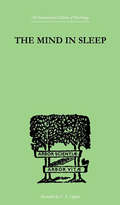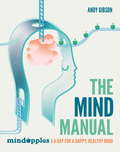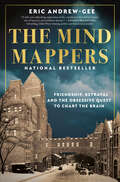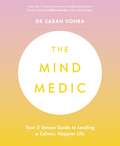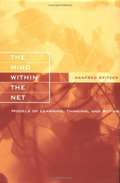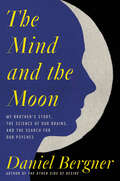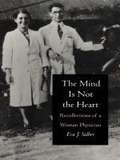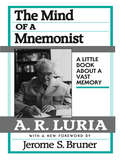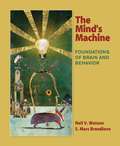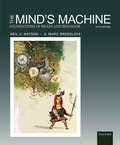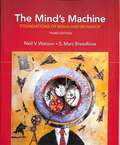- Table View
- List View
The Midwife's Nine-Month Miracle
by Shelley RiversMeet a husband and wife in need of a miracle in Shelley Rivers&’s latest touching Harlequin Medical Romance.A baby……to heal them? When nurse Gila said &“I do&” to a lifetime of love with Dr. Leo, she never imagined that their one-of-a-kind connection would be ripped apart just as she discovered she was expecting a baby. Now Gila is eight-months pregnant—and stunned to learn that her estranged husband has become her temporary colleague! While Gila and Leo are determined to co-parent their child, will a workplace reunion lead them to the happily-ever-after they once dreamed of?From Harlequin Medical: Life and love in the world of modern medicine.
The Midwife's One-Night Fling: The Midwife's One-night Fling / Baby Miracle In The Er (Mills And Boon Medical Ser.)
by Carol MarinelliIs one night with Dr. Off-Limits…The best mistake of her life? Escaping her rural Scottish hometown, midwife Freya has a new job in busy London…and a new crush on sexy consultant Richard Lewis! Charismatic yet commitment-phobic bachelor Richard comes with warning signs, but Freya knows one night would be worth the risk. And when she ends up in Richard’s bed, it feels like a red-hot dream—one Freya doesn’t want to wake up from…
The Midwife's Pregnancy Miracle (Christmas Miracles in Maternity #2)
by Kate HardyTheir precious Christmas surprise…Midwife Ella O’Brien loves babies, but she believes she can’t have her own. Until at a charity ball the chemistry between her and dashing obstetrician Oliver Darrington explodes into a night of passion that proves her wrong!Aristocratic Oliver has been here before, but the baby wasn’t his! Now he’s guarding his emotions—even from lovely, innocent Ella. Can the baby they both want so much help them to trust in their love this Christmas…and become the family they really long for?
The Midwife's Secret Child: Rescued By The Single Dad Doc / The Midwife's Secret Child (the Midwives Of Lighthouse Bay) (The Midwives of Lighthouse Bay #3)
by Fiona McArthurTorn apart by circumstance…Reunited by their child…When doctor Raimondo Salvanelli was forced to walk out of her life, midwife Faith Fetherstone was heartbroken and, unknowingly, pregnant! Her letter to tell him went unanswered, so she dedicated herself to being the best mom she could be. Now Raimondo has returned, having finally discovered he’s a dad! He so wants to be part of their lives, but can he convince Faith to trust him with their daughter’s heart—and her own?The Midwives of Lighthouse Bay trilogyBook 1 – A Month to Marry the MidwifeBook 2 – Healed by the Midwife’s KissBook 3 – The Midwife’s Secret Child“I absolutely adored the story…. Highly recommended for fans of contemporary romance. I look forward to reading more of Fiona McArthur's work.”—Goodreads on Healed by the Midwife’s Kiss“What a wonderful way to start a series Ms. McArthur has done with a book that was filled with plenty of emotion…. The way this story started with the prologue sets the fast-pace of this story….”—Harlequin Junkie on A Month to Marry the Midwife
The Midwife's Secret Fling
by JC HarrowayIn JC Harroway&’s latest Harlequin Medical Romance, a single mom dives into a secret no-strings fling with her new tenant… TEMPTATION ACROSS THE WAY… Returning home from a winter night shift, all single mom and midwife Zara can think about is sleep. Only to be confronted by a naked stranger in her cottage! She immediately jumps to the wrong conclusion, before realizing the hunky Australian is her new tenant, locum Dr. Conrad. If there was ever a man she could have a no-strings fling with, it&’s Conrad. He has &“casual&” written all over him. And since her son&’s father abandoned them, that&’s the most Zara can handle. But keeping their passionate trysts a secret—and temporary!—is harder than expected…From Harlequin Medical: Life and love in the world of modern medicine.
The Migraine Brain: Your Breakthrough Guide to Fewer Headaches, Better Health
by Carolyn Bernstein Elaine McardleYou know that your migraine isn't just a headache. But you may not know that migraine actually is a neurological disease. Affecting one in five women, one in twenty men, and one in twenty children, it's a debilitating, complex, and chronic condition that manifests in a combination of symptoms that can include excruciating head pain as well as other distinctive physical and emotional effects. Yet it's also a disease that you can get control of, improve, and manage, as Dr. Carolyn Bernstein has discovered in her seventeen years as a Harvard Medical School faculty member and practicing neurologist. Praised for her excellence and compassion, the founder of the Women's Headache Center near Boston, and a migraine sufferer herself, Dr. Bernstein has helped hundreds of her patients get better. Now, with The Migraine Brain, the most comprehensive, up-to-the-minute book on migraines ever written, you will be able to do the same -- reduce the frequency and intensity of your migraines, learn how to prevent and curtail them and how to recover from them more quickly, and mitigate migraine's effects on every aspect of your life: in the workplace and at home and during sex and travel. Every migraine is different because everyone who gets a migraine has a distinctive "Migraine Brain" with its own sensitivities and triggers. That's why it's so important for you to develop a personalized wellness plan to radically reduce the number and severity of your migraines. Dr. Bernstein also explains why migraines happen, why they are so often misdiagnosed, and why so few people get the right treatment for them. She reveals the latest research that shows that Migraine Brains share a hypersensitivity to stimuli -- the Migraine Brain can actually look different from others on a brain scan -- and is more likely to experience a cascade of neurological reactions that give rise to the common clusters of migraine symptoms. This breakthrough medical knowledge makes treatment and recovery possible with new migraine-specific drugs as well as with complementary treatments such as yoga, biofeedback, and an exercise regimen. With the extraordinarily thorough recommendations of The Migraine Brain in your hands, you will be fully equipped with all the latest information you need to understand migraines and to help your family and co-workers understand that migraine isn't just a headache: it's a serious, yet treatable disease.
The Milan System for Reporting Salivary Gland Cytopathology
by William C. Faquin Esther Diana Rossi Zubair Baloch Güliz A. Barkan Daniel F. I. Kurtycz Philippe Vielh Maria Pia Foschini Marc P. PusztaszeriThe Second Edition of The Milan System for Reporting Salivary Gland Cytopathology, like the First Edition, represents a collaborative effort by a multidisciplinary group of cytopathologists, surgical pathologists, molecular pathologists, radiologists, and head and neck surgeons. This international group shares the goal of creating a practical and uniform reporting system for salivary gland fine needle aspiration (FNA). This book is organized into six general diagnostic categories: “Non-Diagnostic,” “Non-Neoplastic,” “Atypia of Undetermined Significance (AUS),” “Neoplasm: Benign,” “Neoplasm: Salivary Gland Neoplasm of Uncertain Malignant Potential (SUMP),” “Suspicious for Malignancy,” and “Malignant.” It includes definitions, morphologic criteria, and explanations for each of the diagnostic categories. Specific chapters are dedicated to the application of the latest available ancillary studies, radiologic features of salivary gland lesions, clinical management, and histological considerations including updates from the most recent 5th Edition WHO blue book. The Milan System for Reporting Salivary Gland Cytopathology 2nd Edition represents an essential step towards increasing the overall effectiveness of salivary gland FNA and fostering better communication between clinicians and between institutions to improve overall patient care.
The Mimosa Tree
by Antonella PretoThis is a beautifully written, heartfelt look at the effects of breast cancer and the loss of a loved one to the disease. It’s the summer of 1987, and Mira is beginning her first year at university. She has a radical new haircut, and an all-black wardrobe: she should be having the time of her life. But, it’s hard for her to get excited about anything when she’s being smothered by her crazy Italian family, enrolled in a course she’s not interested in, and expecting nuclear warfare at any moment. Even a new best friend and the magnetic boy from art class can’t wipe away the image of a looming mushroom cloud—her mother has breast cancer. Mira’s world is about to explode, but it’s not the skies she should be checking.
The Mind And Its Body: THE FOUNDATIONS OF PSYCHOLOGY
by Fox, CharlesFirst Published in 1999. Routledge is an imprint of Taylor & Francis, an informa company.
The Mind And The Brain: Neuroplasticity And The Power Of Mental Force
by Sharon Begley Jeffrey M. SchwartzA groundbreaking work of science that confirms, for the first time, the independent existence of the mind-and demonstrates the possibilities for human control over the workings of the brain. Conventional science has long held the position that 'the mind' is merely an illusion, a side effect of electrochemical activity in the physical brain. Now in paperback, Dr Jeffrey Schwartz and Sharon Begley's groundbreaking work, The Mind and the Brain, argues exactly the opposite: that the mind has a life of its own. Dr Schwartz, a leading researcher in brain dysfunctions, and Wall Street Journal science columnist Sharon Begley demonstrate that the human mind is an independent entity that can shape and control the functioning of the physical brain. Their work has its basis in our emerging understanding of adult neuroplasticity-the brain's ability to be rewired not just in childhood, but throughout life, a trait only recently established by neuroscientists. Through decades of work treating patients with obsessive-compulsive disorder (OCD), Schwartz made an extraordinary finding: while following the therapy he developed, his patients were effecting significant and lasting changes in their own neural pathways. It was a scientific first: by actively focusing their attention away from negative behaviors and toward more positive ones, Schwartz's patients were using their minds to reshape their brains-and discovering a thrilling new dimension to the concept of neuroplasticity. The Mind and the Brain follows Schwartz as he investigates this newly discovered power, which he calls self-directed neuroplasticity or, more simply, mental force. It describes his work with noted physicist Henry Stapp and connects the concept of 'mental force' with the ancient practice of mindfulness in Buddhist tradition. And it points to potential new applications that could transform the treatment of almost every variety of neurological dysfunction, from dyslexia to stroke-and could lead to new strategies to help us harness our mental powers. Yet as wondrous as these implications are, perhaps even more important is the philosophical dimension of Schwartz's work. For the existence of mental force offers convincing scientific evidence of human free will, and thus of man's inherent capacity for moral choice.
The Mind Electric: A Neurologist on the Strangeness and Wonder of Our Brains
by Pria AnandIn this collection of medical tales &“reminiscent of Oliver Sacks...the best of medical writing&” (Abraham Verghese, author of The Covenant of Water), a neurologist reckons with the stories we tell about our brains, and the stories our brains tell us.A girl believes she has been struck blind for stealing a kiss. A mother watches helplessly as each of her children is replaced by a changeling. A woman is haunted each month by the same four chords of a single song. In neurology, illness is inextricably linked with narrative, the clues to unraveling these mysteries hidden in both the details of a patient's story and the tells of their body. Stories are etched into the very structure of our brains, coded so deeply that the impulse for storytelling survives and even surges after the most devastating injuries. But our brains are also porous—the stories they concoct shaped by cultural narratives about bodies and illness that permeate the minds of doctors and patients alike. In the history of medicine, some stories are heard, while others—the narratives of women, of Black and brown people, of displaced people, of disempowered people—are too often dismissed. In The Mind Electric, neurologist Pria Anand reveals—through case study, history, fable, and memoir—all that the medical establishment has overlooked: the complexity and wonder of brains in health and in extremis, and the vast gray area between sanity and insanity, doctor and patient, and illness and wellness, each separated from the next by the thin veneer of a different story. Moving from the Boston hospital where she treats her patients, to her childhood years in India, to Isla Providencia in the Caribbean and to the Republic of Guinea in West Africa, she demonstrates again and again the compelling paradox at the heart of neurology: that even the most peculiar symptoms can show us something universal about ourselves as humans.
The Mind Electric: Stories of the Strangeness and Wonder of Our Brains
by Pria Anand'Superb, compelling, delightfully labyrinthine' Telegraph'The book fans of Oliver Sacks have been craving' The i'A rich and humane work' Gwen Adshead, author of The Devil You Know'A fascinating journey through the curious capacities of our brains' Elinor Cleghorn, author of Unwell WomenA young woman channelling the voice of the Holy Spirit. A mother whose children have been replaced by changelings. A family cursed by a mysterious inability to sleep. Pria Anand's patients come to her with myriad peculiar symptoms, but they all have something in common: their diagnosis always hinges on a story. Her task as a neurologist is akin to a detective's, piecing together the clues in a patient's account with the tells of their body in order to settle on a diagnosis.In her gorgeously lyrical, passionate and humane first book, Pria Anand shares stories of her own patients alongside her own experiences as a doctor, a mother and a patient, in order to explore all the bizarre ways in which our brains go awry. Moving from the Boston hospital where she treats her patients, to her childhood years in India, to Isla Providencia in the Caribbean and to Guinea in West Africa, she demonstrates again and again the compelling paradox at the heart of neurology: that the strangest symptoms experienced by any single individual can show us something universal about being human.
The Mind Electric: Stories of the Strangeness and Wonder of Our Brains
by Pria Anand'Superb, compelling, delightfully labyrinthine' Telegraph'The book fans of Oliver Sacks have been craving' The i'A rich and humane work' Gwen Adshead, author of The Devil You Know'A fascinating journey through the curious capacities of our brains' Elinor Cleghorn, author of Unwell WomenA young woman channelling the voice of the Holy Spirit. A mother whose children have been replaced by changelings. A family cursed by a mysterious inability to sleep. Pria Anand's patients come to her with myriad peculiar symptoms, but they all have something in common: their diagnosis always hinges on a story. Her task as a neurologist is akin to a detective's, piecing together the clues in a patient's account with the tells of their body in order to settle on a diagnosis.In her gorgeously lyrical, passionate and humane first book, Pria Anand shares stories of her own patients alongside her own experiences as a doctor, a mother and a patient, in order to explore all the bizarre ways in which our brains go awry. Moving from the Boston hospital where she treats her patients, to her childhood years in India, to Isla Providencia in the Caribbean and to Guinea in West Africa, she demonstrates again and again the compelling paradox at the heart of neurology: that the strangest symptoms experienced by any single individual can show us something universal about being human.
The Mind In Sleep (International Library Of Psychology Ser.)
by Fortune, R FThis is Volume V of thirty-eight in the General Psychology series. First published in 1927, this study analyses the key elements of dreams of the author in a quest to understand how the mind functions when asleep and to explore free association.
The Mind Manual: Mindapples 5 a Day for a Happy, Healthy Mind
by Andy GibsonFrom the people who brought you the Mindapples "5-a-day for your mind" campaign, The Mind Manual is an accessible guide to what's going on in your head. From understanding how your own mind works, to making sense of the behaviour of others, this is a practical guide to managing your mind and using it to get the life you want. The book uses proven insights from neuroscience and psychology, filtered through the wisdom and experience of thousands of people in Mindapples' global community, to give you a crash-course in understanding your own mind. It will improve your well-being, your ability to cope with stress, and your understanding of yourself and others, and give you the tools you need to be your best self, with chapters including:How to Be YourselfHow to Keep CalmHow to Be HappyHow to Have a Healthy MindHow to Be WiseHow to Be ProductiveHow to Be ResilientHow to Be KindHow to Fall in Love
The Mind Manual: Mindapples 5 a Day for a Happy, Healthy Mind (Dr Alex George)
by Andy GibsonFrom the people who brought you the Mindapples "5-a-day for your mind" campaign, The Mind Manual is an accessible guide to what's going on in your head. From understanding how your own mind works, to making sense of the behaviour of others, this is a practical guide to managing your mind and using it to get the life you want. The book uses proven insights from neuroscience and psychology, filtered through the wisdom and experience of thousands of people in Mindapples' global community, to give you a crash-course in understanding your own mind. It will improve your well-being, your ability to cope with stress, and your understanding of yourself and others, and give you the tools you need to be your best self, with chapters including:How to Be YourselfHow to Keep CalmHow to Be HappyHow to Have a Healthy MindHow to Be WiseHow to Be ProductiveHow to Be ResilientHow to Be KindHow to Fall in Love
The Mind Mappers: Friendship, Betrayal and the Obsessive Quest to Chart the Brain
by Eric Andrew-GeeThe riveting true story of the star-crossed friendship between two neuroscientists—one famous, the other forgotten—who mapped the brain, but lost each other.In the early 1920s, when neurosurgery was more likely to be a death sentence than a cure, two men revolutionized the study of the brain: Wilder Penfield and William Cone. Drawn together by their shared fascination with the &“undiscovered country&” inside our heads, the surgeons formed a partnership and within ten years established the Montreal Neurological Institute in a Gothic stone hospital on the slope of a mountain. The Neuro soon became the world&’s leading centre for neurological study, attracting men and women from across the globe to a booming mid-century city.But their success came at the cost of their friendship.While Cone spent long hours at patients&’ bedsides and in the blood-spattered operating room, Penfield pursued the loftier goal of discovering the seat of consciousness. The Chief, as he was known, went on to develop the Montreal procedure for treating epilepsy, which helped identify the source of speech, executive function and memory in narrow slivers of grey matter—achievements that illuminated the relationship between mind and body, made possible by Cone&’s anonymous work behind the scenes. Over time, their relationship became fraught with personal and professional hurts—and suddenly ended when Cone was found dead in his office at the age of sixty-two.In this compelling dual biography, Globe and Mail journalist Eric Andrew-Gee weaves together the rich history of The Neuro with that of Penfield and Cone to reveal the untold story of one of the birthplaces of neuroscience. In doing so, he breathes new life into a familiar hero and revives the tragic, forgotten story of his partner, writing Dr. William Cone back into the historical record at last.
The Mind Medic: Your 5 Senses Guide to Leading a Calmer, Happier Life
by Dr Sarah Vohra*For fans of Fearne Cotton's Calm and Matt Haig's Notes of a Nervous Planet*At some point in our lives we will all struggle with our mental health. But how many of us know what to actually do when we're struggling? How do you spot the warning signs and what can you do to stop things from escalating? From leading Consultant Psychiatrist, Dr Sarah Vohra (aka The Mind Medic), comes The 5 Senses Plan - a practical guide to improving your mental wellbeing using your 5 senses to help you along the way. The 5 Senses Plan offers expert advice and easy-to-follow exercises on how to optimise your senses, including:· SIGHT: how to see beyond the negative and use CBT techniques to reframe thought patterns· HEARING: exploring the role of a mentor and creating a space to listen and be listened to· SMELL: how to introduce calming scents into your life and the science behind aromatherapy · TOUCH: putting your worries in a worry box to help validate and contain your thoughts · TASTE: how to eat for your mind and discovering mood-boosting micronutrientsDr Vohra debunks the myths and conflicting advice surrounding mental health, setting out a 10-week plan to equip you with the knowledge and strategies for a happier, calmer mind. With The 5 Senses Plan, feel empowered with the knowledge to take control of your own mental health, the confidence to have honest conversations and the strength to seek support early.
The Mind Within the Net: Models of Learning, Thinking and Acting
by Manfred SpitzerIn The Mind within the Net, Manfred Spitzer shows how these models can fundamentally change how we think about learning, creativity, thinking, and acting, as well as such matters as schools, retirement homes, politics, and mental disorders.
The Mind and the Moon: My Brother's Story, the Science of Our Brains, and the Search for Our Psyches
by Daniel Bergner“A profound and powerful work of essential reporting." —The New York Times Book ReviewAn important—and intimate—interrogation of how we treat mental illness and how we understand ourselvesIn the early 1960s, JFK declared that science would take us to the moon. He also declared that science would make the “remote reaches of the mind accessible” and cure psychiatric illness with breakthrough medications. We were walking on the moon within the decade. But today, psychiatric cures continue to elude us—as does the mind itself. Why is it that we still don’t understand how the mind works? What is the difference between the mind and the brain? And given all that we still don’t know, how can we make insightful, transformative choices about our psychiatric conditions?When Daniel Bergner’s younger brother was diagnosed as bipolar and put on a locked ward in the 1980s, psychiatry seemed to have achieved what JFK promised: a revolution of chemical solutions to treat mental illness. Yet as Bergner’s brother was deemed a dire risk for suicide and he and his family were told his disorder would be lifelong, he found himself taking heavy doses of medications with devastating side effects.Now, in recounting his brother’s journey alongside the gripping, illuminating stories of Caroline, who is beset by the hallucinations of psychosis, and David, who is overtaken by depression, Bergner examines the evolution of how we treat our psyches. He reveals how the pharmaceutical industry has perpetuated our biological view of the mind and our drug-based assumptions about treatment—despite the shocking price paid by many patients and the problematic evidence of drug efficacy. And he takes us into the pioneering labs of today’s preeminent neuroscientists, sharing their remarkably candid reflections and fascinating new theories of treatment.The Mind and the Moon raises profound questions about how we understand ourselves and the essential human divide between our brains and our minds. This is a book of thought-provoking reframings, delving into the science—and spirit—of our psyches. It is about vulnerability and personal dignity, the terrifying choices confronted by families and patients, and the prospect of alternatives. In The Mind and the Moon, Bergner beautifully explores how to seek a deeper engagement with ourselves and one another—and how to find a better path toward caring for our minds.
The Mind is Not the Heart: Recollections of a Woman Physician
by Eva J. SalberAvailable for the first time in paperback, Eva Salber's The Mind Is Not the Heart (originally published in 1989), is the personal and political story of a white, Jewish, South African woman who practiced medicine for over fifty years among the impoverished--both rural and urban, black and white, in South Africa and later in the United States. Her lifelong dedication to providing health care to poor people was informed by a passionate vision of the link between social problems and medicine, accompanied by an embracing involvement with the communities in which she served. In this warm clear-eyed account, Dr. Salber presents not only her own personal journey, that of a professional woman, teacher, wife, and mother, but also the story of the people on the margins of society among whom she worked.
The Mind of a Mnemonist: A Little Book about a Vast Memory, With a New Foreword by Jerome S. Bruner
by A. R. LuriaThis study explores the inner world of a rare human phenomenon—a man who was endowed with virtually limitless powers of memory. From his intimate knowledge of S., the mnemonist, gained from conversations and testing over a period of almost thirty years, A. R. Luria is able to reveal in rich detail not only the obvious strengths of S.’s astonishing memory but also his surprising weaknesses: his crippling inability to forget, his pattern of reacting passively to life, and his uniquely handicapped personality.
The Mind's Machine: Foundations of Brain and Behavior
by S. Marc Breedlove Neil V. WatsonThe book introduces us to the basics of behavioral neuroscience in a way that focuses on the foundational topics in the field.
The Mind's Machine: Foundations of Brain and Behavior
by S. Marc Breedlove Neil WatsonThe fifth edition of The Mind's Machine captivates students of all backgrounds through coverage of contemporary research, clinical cases, experiments, and compelling examples that directly relate to their lives and fields of interest. The Mind's Machine, Fifth Edition, introduces readers to the basics of behavioral neurosciences and the newest and most fascinating discoveries. This bestselling text offers an engaging introduction to the interdisciplinary topics of introductory behavioral neuroscience. It is designed to cater to a wide range of students, including non-science majors to those majoring in psychology, life sciences, and neuroscience. The Mind's Machine successfully presents neuroscience concepts in a manner that is accessible and meaningful to a diverse audience while maintaining scientific accuracy. Moreover, it provides examples from diverse fields within neuroscience, providing students with a comprehensive understanding of the subject matter.
The Mind's Machine: Foundations of Brain and Behavior (Sinauer Series)
by S. Marc Breedlove Neil V. WatsonThe Mind's Machine, introduced in 2012, was written to impart the core concepts of behavioral neuroscience to students in a diverse range of disciplines, including not only psychology and the other life sciences, but art, philosophy, media studies, linguistics, and the like. <p><p>Using streamlined text, full color art, novel pedagogical features, and real life examples and analogies, The Mind's Machine, Third Edition, engages students new to neuroscience without sacrificing accuracy. This accessible, reader friendly book is appropriate for brain and behavior, biopsychology, and physiological psychology courses.
